Archivos
-
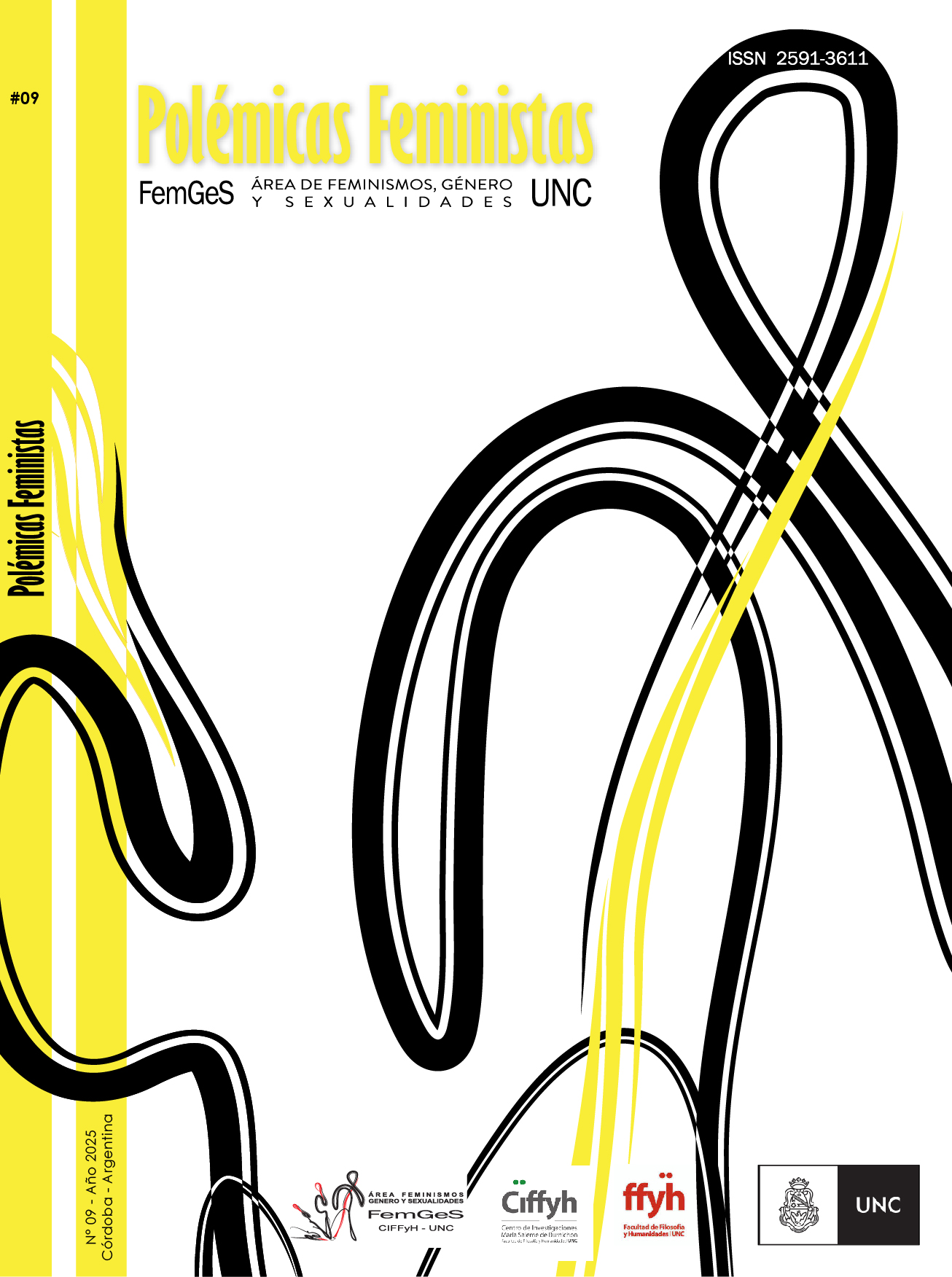
¿Todavía importa el trabajo? Transformaciones laborales, experiencias organizativas y resistencias feministas en el neoliberalismo
Vol. 9 Núm. 1 (2025)En el contexto de hegemonía del capitalismo financiarizado a nivel global, asentado en el aprovechamiento del desarrollo tecnológico acelerado y en la expoliación de los territorios y poblaciones subordinadas, los mercados de trabajo -así como las formas, sentidos y conflictos que configuran el llamado “mundo del trabajo” en la actualidad- presentan rasgos novedosos. En Argentina, la persistencia de brechas y segmentaciones expone el carácter estructural de la desigualdad laboral, en la que el género constituye una dimensión insoslayable. Al mismo tiempo, la flexibilidad, la automatización, la individualización y la implementación de nuevos mecanismos de control se consolidan como rasgos centrales del trabajo contemporáneo, e impactan en las regulaciones, experiencias, sentidos, formas de organización y acción colectiva de lxs trabajadorxs. Desde la multiplicidad teórica de los feminismos, en este dossier aspiramos a interrogar, repensar y debatir las transformaciones del trabajo y las formas de ejercicio del poder colectivo de lxs trabajadorxs frente al imperativo de acumulación capitalista.
-
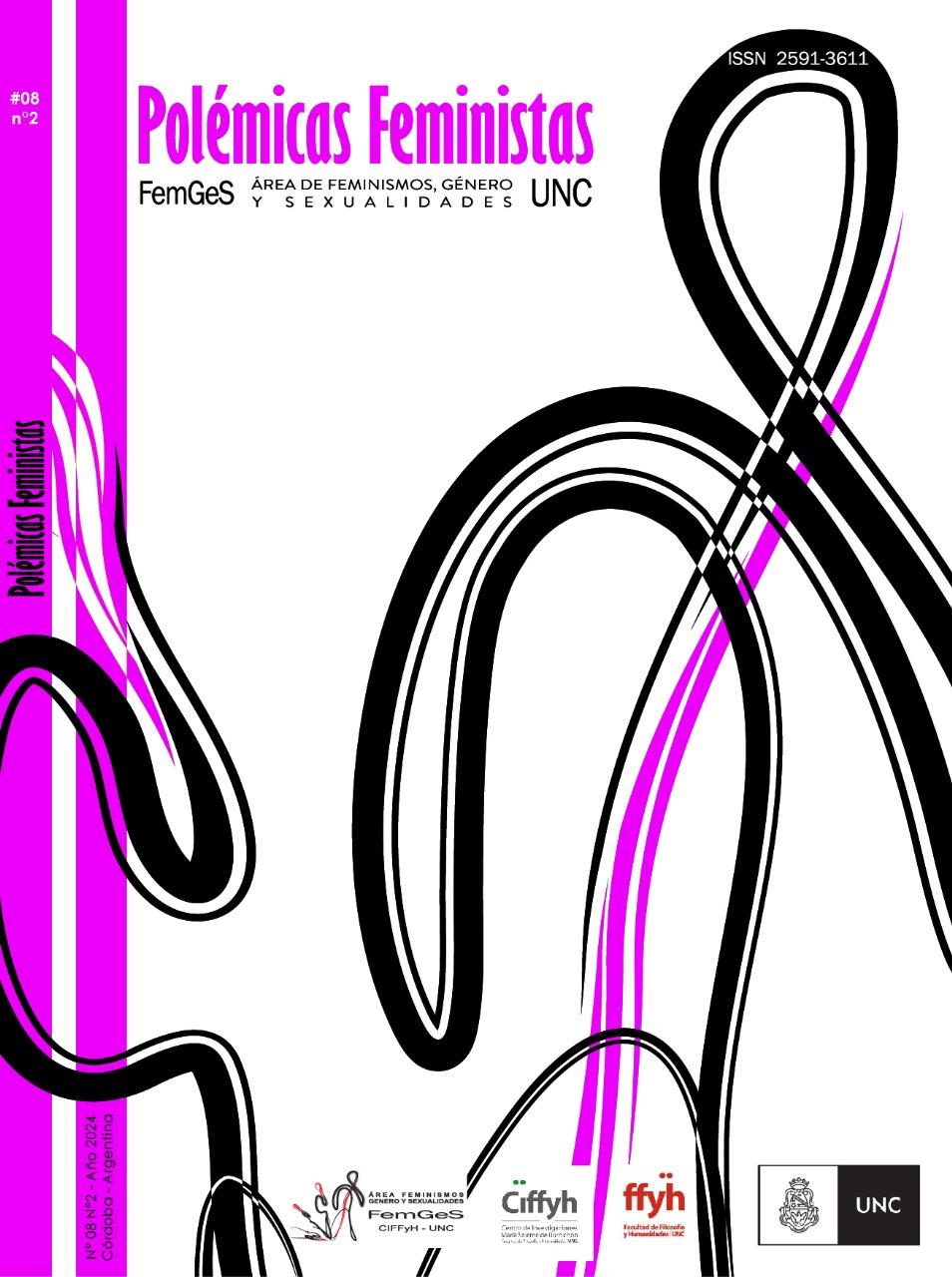
Feminismos y disidencias sexuales en zona de combate: acciones y reacciones frente a las ultraderechas
Vol. 8 Núm. 2 (2024)Las (nuevas) derechas y sus aliadas militaristas no son fenómenos nuevos, aunque la singularidad de un tiempo-espacio siempre impregna de novedad. En América toda (aunque es rotundamente global), el fenómeno trumpista y bolsonarista fue tejiéndose lenta y efectivamente no solo en la relación de alcoba de partidos y empresas, sino en las bases sociales, entre la gente. “Ultraderecha”, “extrema derecha" son categorías políticas que fueron cobrando formas posibles de llegar a las urnas, de ser elegidas, de finalmente gobernar. Lo vimos desde una distancia que creíamos inmune en la confianza (no tan ingenua) y en la democracia construida durante cuarenta años a fuerza de contradicciones, desafíos, calle, derechos humanos, feminismos y movimiento LGBTIQ multiplicándose y ensanchando la vida común. El año 2023 marcó un hito que creíamos imposible: la composición de fuerzas de extrema derecha y militaristas lograba llegar a una fórmula presidencial (ya había parlamentarios/as y más) y lograba constituirse en un ballotage tenso y sombrío en la nueva presidencia de Argentina.
¿Qué (nos) pasó? Dadas las diversas e imprevistas limitaciones de este año, no llegamos a organizar un Dossier como venimos haciendo en los volúmenes previos. Aún así pudimos darle identidad a este número desde La Polémica. A partir de los interrogantes desplegados en la convocatoria y otros sugeridos posteriormente, referentes locales plantearon sus posicionamientos frente al desafío que nos convoca: cuestionar y replantear algunas de las derivas de lo que, desde ciertos sectores políticos y sociales, podemos entender polémicamente como una “mala praxis feminista” (desindentificatoria, “piantavotos”) o, por el contrario, fortalecer y erigir con perseverancia las prácticas y banderas que consideramos irrenunciables. La Polémica sigue abierta y esperamos con ansias su participación. -
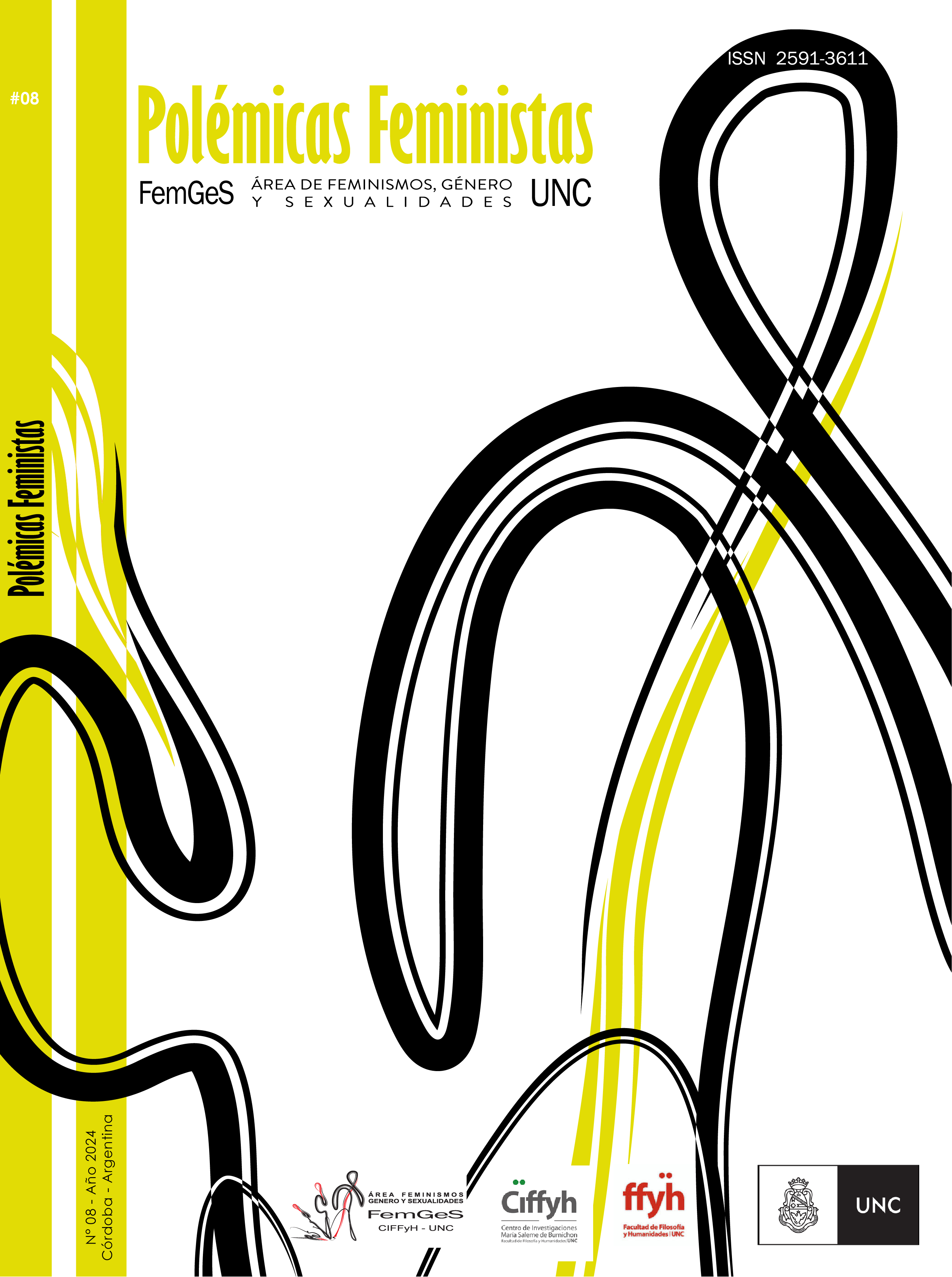
Feminismos y disidencias sexuales en zona de combate: acciones y reacciones frente a las ultraderechas
Vol. 8 Núm. 1 (2024)Éste es un año de fuertes conmociones para la Argentina, aunque no sólo para quienes residimos dentro de la frontera estatal. Los efectos de las ultraderechas neoliberales antidemocráticas vienen conmocionando los horizontes políticos e ideológicos en todo el mundo. Proclamas y programas políticos que, después de arduas luchas y combates, creíamos enterrados, o al menos sancionados públicamente por atentar contra derechos humanos fundamentales, reaparecen en formatos crueles y agravados en la legitimidad del espanto. ¿Cómo accionamos, creativa y efectivamente frente a este escenario, los feminismos y las disidencias sexuales? ¿Cómo reaccionamos y resistimos al mismo tiempo? Cuando todo parece ponerse en cuestión, ¿a qué principios y luchas nos aferramos? ¿Qué zonas de combate priorizamos? ¿o vamos por todo y por todes en la revitalización de la democracia, del sentido de lo público y de la puesta en valor central de lo común? En este número de transición de una revista anual a otra semestral, el Equipo Editorial de Polémicas Feministas les invita a compartir sus reflexiones para imaginar y crear un nuevo presente igualitario, creativo, justo y amoroso con el ingrediente de siempre: el valor y la potencia del pensar, hacer y sentir de forma colectiva.
-
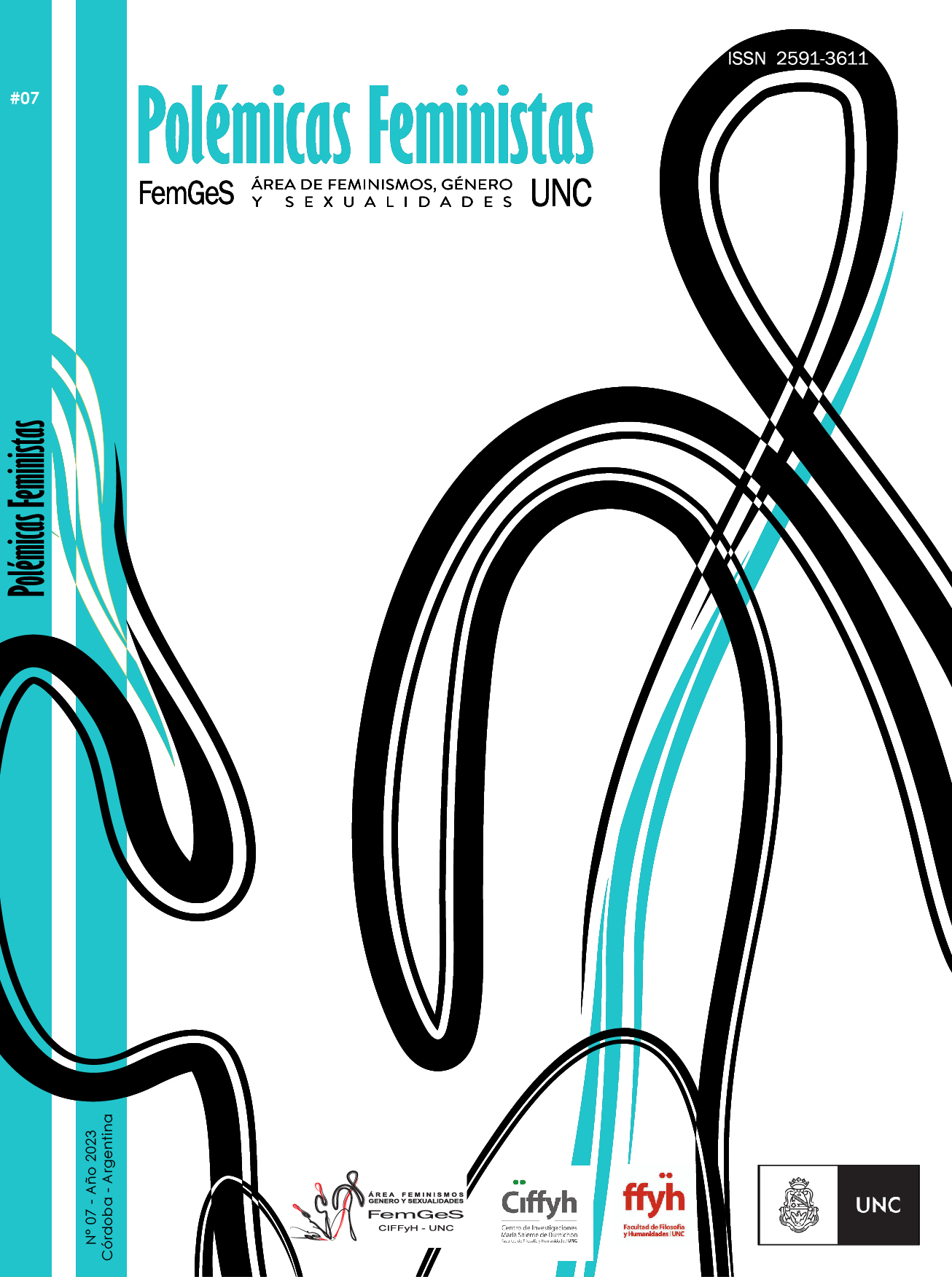
Construyendo respuestas frente a las violencias de género en las Universidades
Vol. 7 (2023)Otro año que se cierra y nos encuentra en un estado de incertidumbre y perplejidad. Un retorno ruidoso y violento a relatos que creímos eran del pasado. Nuestro país ha elegido democráticamente a una fuerza política de ultraderecha neoconservadora y neoliberal, misógina y homofóbica, que ha afirmado públicamente que las desigualdades de género y todas las formas de violencias en razón de los géneros, son una ficción, pura ideología, asunto privado. Una fuerza política que ha instalado, como parte de tendencias globales, la premisa de la libertad como equivalente a libre mercado y propiedad. En este marco, nuestra labor editorial, como revista feminista de una universidad pública cordobesa, se torna imprescindible. Ya no se trata sólo de difundir y dar a conocer las investigaciones, los debates y las prioridades de un sector social y político específico, sino de sostenerlas como pilares básicos e imprescindibles de una democracia constitucional comprometida en cada acto cotidiano con la defensa de lo público, de los derechos humanos y del Abya Yala. Se trata de un camino que involucra lo personal, pero que sólo puede efectivizarse en colectivo. Es un camino que hoy más que nunca requerimos cuidar, sostener y volver a sembrar solidaria y amorosamente.
-
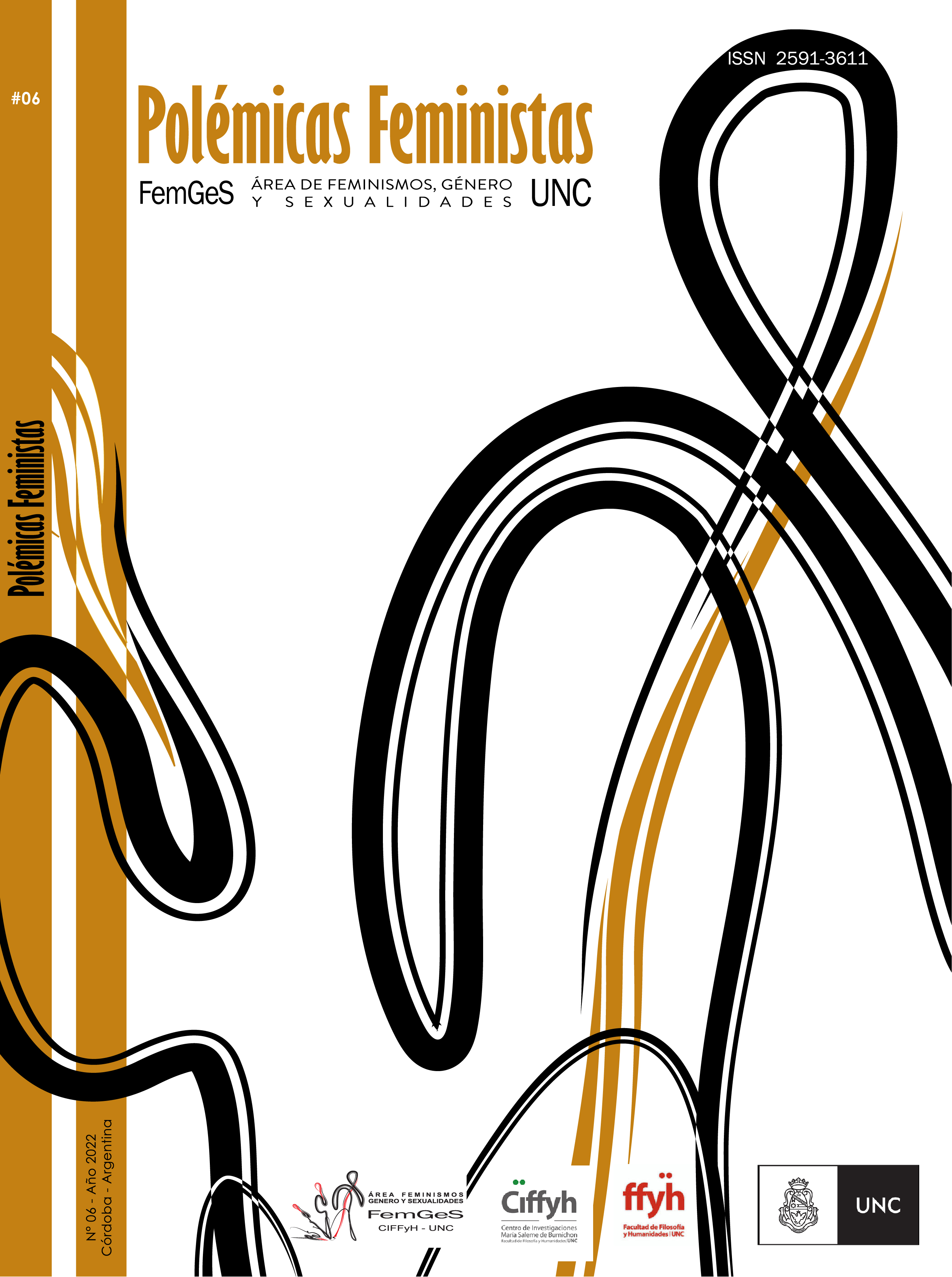
Género, afectos y ficción
Vol. 6 (2022)En este nuevo número de Polémicas Feministas renovamos nuestras esperanzas de la manera que podemos: poniendo a disposición un espacio singular de escritura, de conversación, de disputa, y de creación. Y la muestra contundente de la necesidad de esta instancia fue la recepción de más de 30 trabajos que, luego de las instancias de evaluación por pares, fueron en su mayoría distribuidos en las distintas secciones de la revista, encabezadas por el Dossier: “Género, afectos, ficción”. También se publican Homenajes a nuestras grandes que ya no están, pero cuyo legado permanece activo en nuestras prácticas políticas y académicas: Angélica Gorodischer, Francesca Gargallo y bell hooks. También contamos con ensayos, artículos libres, e investigaciones incipientes, una traducción inédita y necesaria de la gran antropóloga Esther Newton y una Producción de Saberes desde el Arte del colectivo cordobés Bordamos por la Paz. Finalmente, una novedad editorial reunida en la sección de estreno: La Polémica. Como una manera de agenciar nuestro nombre, invitamos a referentes locales a polemizar sobre una temática -en este número, desde una temática vinculada al Dossier relativa a las prácticas que se conocen por su denominación en inglés como pinkwashing y queerbaiting- para luego abrirla al público lector. Quienes estén interesades, podrán participar desde nuestra página web, siguiendo el link habilitado en el resumen de La Polémica.
-
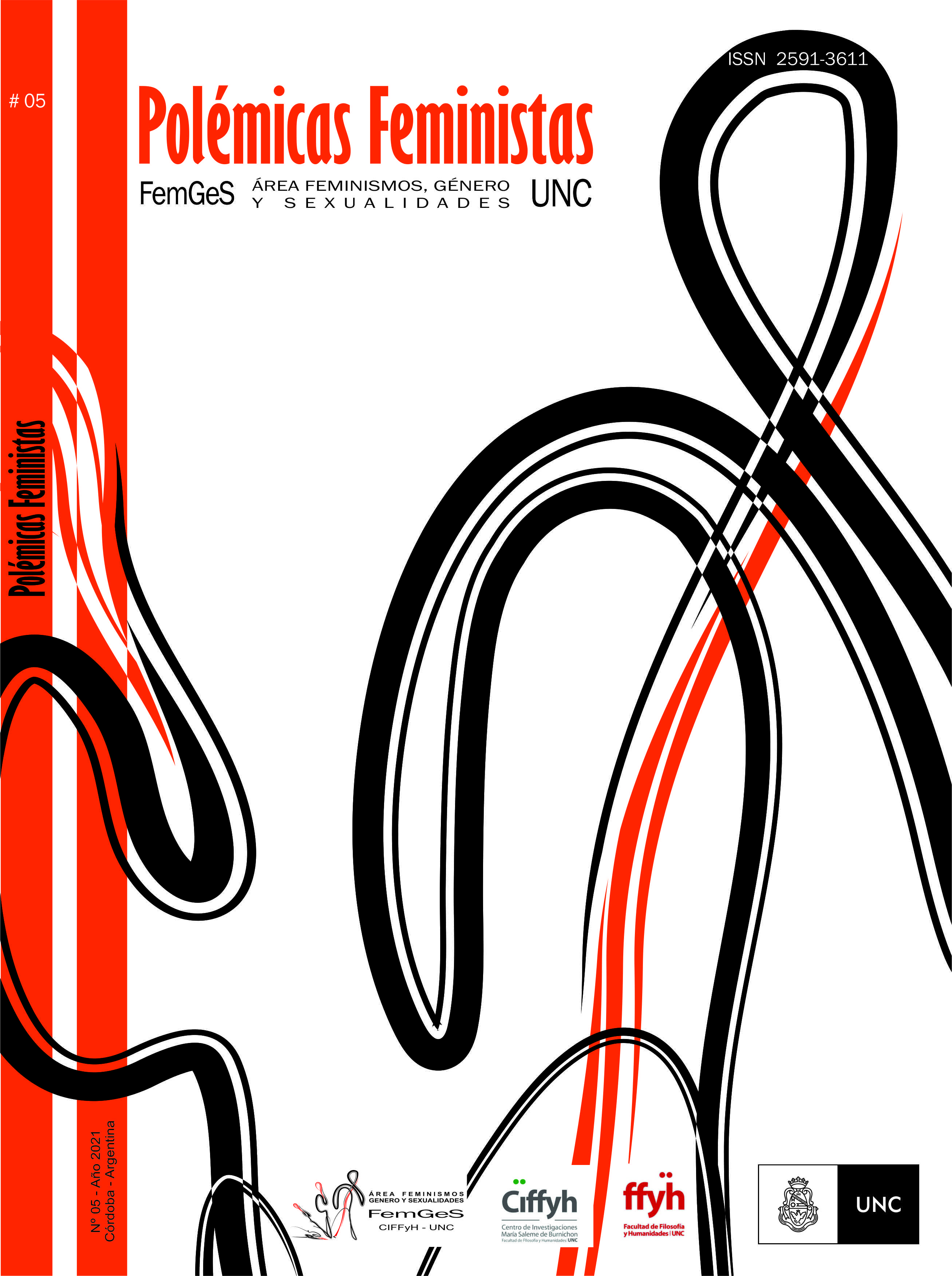
Jóven*s y feminismos en América Latina. Desafíos, transformaciones y nuevos imaginarios
Vol. 5 (2021)Los movimientos feministas, de mujeres y de disidencias han adquirido en los últimos años una marca generacional indudable. La “revolución de las hijas”, la “primavera juvenil”, “las nietas de las brujas”, son metáforas que se utilizaron en Argentina para reflejar el protagonismo de l*s jóven*s, en su mayoría mujeres, en los feminismos. Esta emergencia joven se produce en un escenario de renovadas políticas neoliberales, de (re)surgimiento de discursos conservadores, violentos y discriminatorios, y de prácticas de regulación y control de los cuerpos que niegan el acceso a derechos, en un complejo entramado capitalista, racista y heteropatriarcal. Un hito significativo que motivó para much*s jóven*s el acercamiento al feminismo fue la primera manifestación pública Ni Una Menos, la cual, desde la primera convocatoria en junio de 2015, se configuró como campo de articulación de colectivos (y colectivas), demandas, consignas y al mismo tiempo como un espacio de participación y referencia. Esta juvenilización contribuyó a la masificación del movimiento que devino marea verde en 2018, en el contexto de los debates y manifestaciones por la legalización del aborto en Argentina, juvenilización que forma parte de un fenómeno más amplio que se extiende por distintos países de América Latina. En este dossier de Polémicas Feministas presentamos seis artículos que abordan la complejidad de los vínculos entre las juventudes y los feminismos desde diferentes latitudes -México, Colombia y Argentina-, reflejando las particularidades territoriales en las modalidades de participación y expresión de l*s jóven*s, las resistencias y transformaciones, las agendas y demandas que proponen, las relaciones intergeneracionales y el impacto de las tecnologías en la participación juvenil. Los trabajos recibidos son producto de investigaciones: una de ellas es una revisión bibliográfica y las cinco restantes siguen un enfoque metodológico etnográfico. Las temáticas sobre las que versan las contribuciones seleccionadas abordan los activismos juveniles feministas, los ciberfeminismos, la participación juvenil en temáticas de género y sexualidades en contextos escolares, así como la problematización en clave epistemológica de la (no) representación de las mujeres como sujetas políticas en los estudios de juventud.
-
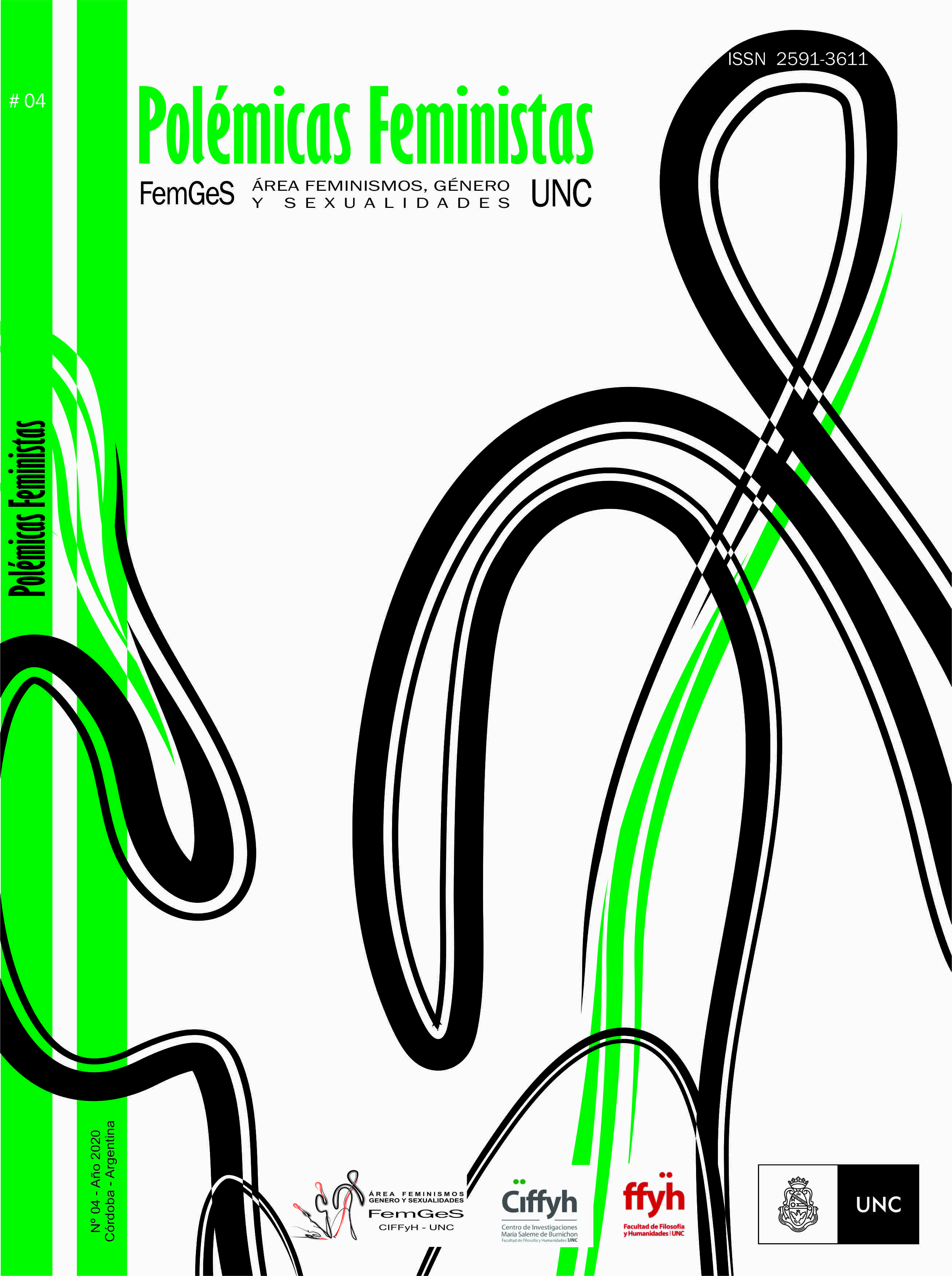
Feminismos y disidencias sexogenéricas en la Argentina: Genealogías, imaginarios políticos y (de)construcciones de lo común
Vol. 4 (2020)Hace casi un año nos preguntábamos si tenía sentido lanzar la convocatoria al cuarto número de Polémicas Feministas; qué significaba, por qué y para qué lo haríamos en un contexto de tanta perplejidad. Finalmente decidimos sostener el proyecto porque consideramos que necesitábamos cuidar espacios ya sembrados, hacerlos crecer, ensancharlos y sumar lugares donde, desde los feminismos, pudiéramos seguir pensando los problemas que nos mueven, nos ocupan, nos atraviesan. Hoy, con este cuarto número, nos llena de alegría reconocer que Polémicas Feministas sigue siendo un proyecto colectivo que se realiza en la lectura atenta y la conversación permanente. Las numerosas contribuciones nos indican que la invitación a participar fue recibida con entusiasmo en los ámbitos activistas y académicos por igual. Diversidad de trabajos poblaron las secciones que propusimos para esta nueva época de la revista: además de los clásicos formatos del dossier, los artículos libres, las entrevistas y las traducciones, se sumaron producciones de escritura colectiva, saber(es) desde el arte e investigaciones incipientes. Los aportes excedieron incluso nuestras expectativas, las desafiaron y nos invitaron a hacerle lugar a otros formatos, como el caso del homenaje a María Lugones o el adelanto de la reedición ampliada y corregida de la biografía política de Carlos Jáuregui, los cuales se publican en este número. Todo este recorrido supuso un enorme aprendizaje por parte de quienes integramos el Equipo Editorial y nos llevó a plantearnos la incorporación de nuevas secciones y otras modificaciones para el futuro.
-
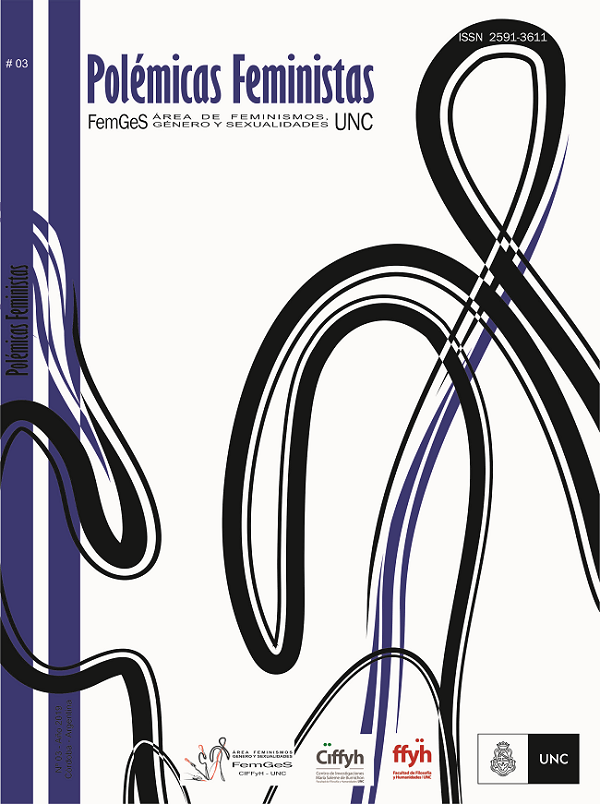
Lo sexual es político
Vol. 3 (2019)En la primera década del siglo XXI, los marcos epistemológicos y las prácticas que vinculan lo sexual con lo político han tenido un desarrollo inédito. Por un lado, han aumentado y se han diversificado las acciones de los activismos relativas a las problemáticas de los cuerpos, las sexualidades, las eroticidades diversas y disidentes; por otro lado, han proliferado las producciones estéticas y artísticas al respecto. Incluso ha habido una importantísima actividad legal e institucional en torno a estos temas: pensemos, por ejemplo, en las leyes nacionales argentinas de salud sexual y reproductiva, de educación sexual, de matrimonio igualitario, de identidad de género, leyes que han sido no sólo logros fundamentales para los feminismos sino también generadores de cambios en la vida sexual en nuestras sociedades. Por eso nos resulta pertinente leer lo que está ocurriendo desde el inicio del nuevo milenio a través del lente que proporciona el lema “lo sexual es político”, el cual claramente retoma aquel otro lema formulado en la década del ‘70, “lo personal es político”, cuando los feminismos entraban con fuerza a disputar la política en el terrero de la intimidad, de lo privado, de los vínculos afectivos y eróticos y de los cuerpos.
-
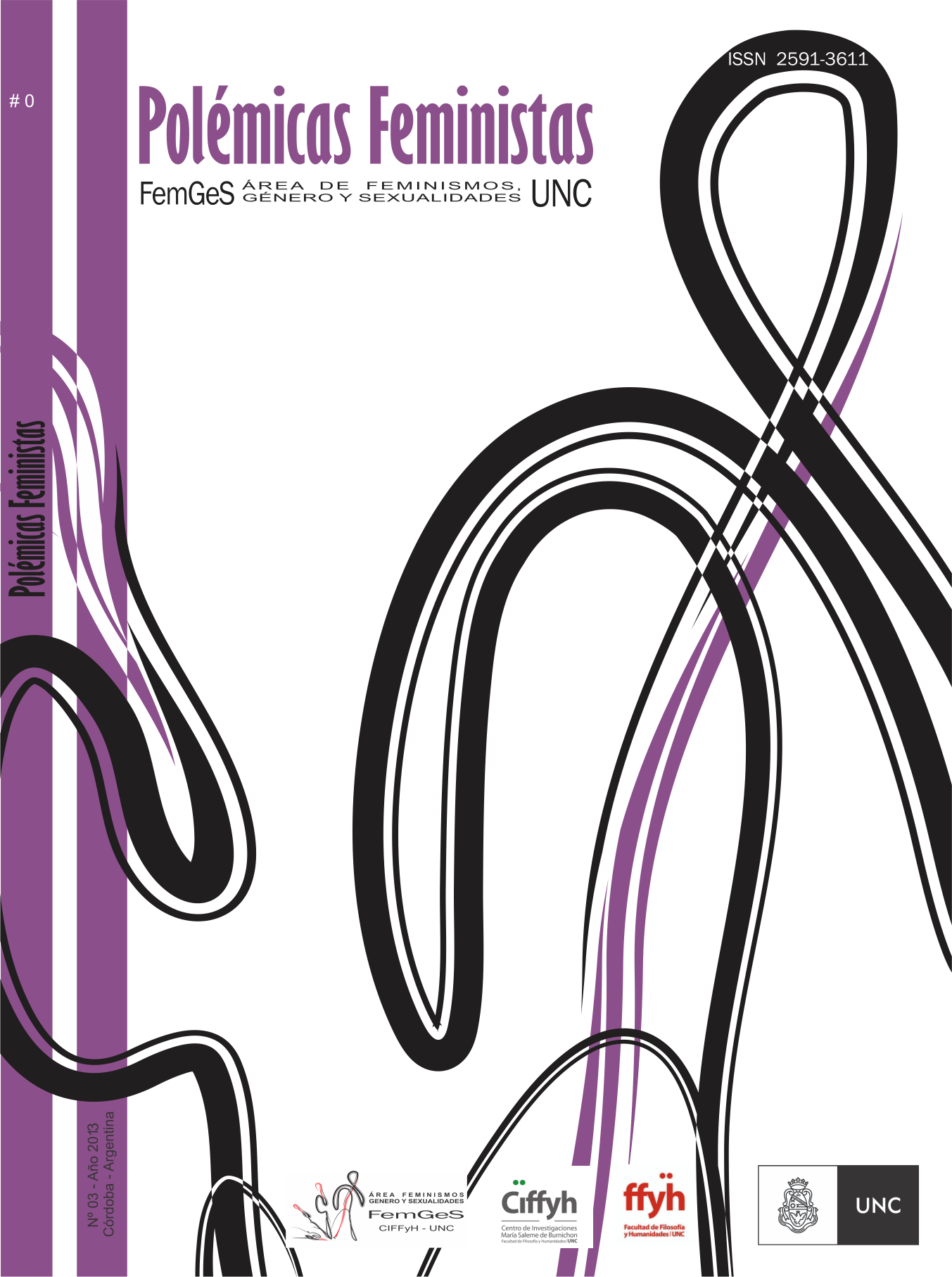
Debates y prácticas en torno a la violencia de género
Vol. 2 (2013)La violencia que se ejerce en virtud del sexo, el género, la opción sexual de una persona es una de las violaciones más denigrantes e insidiosas de los derechos humanos, porque implica invisibilización, exclusión, vulnerabilidad, marginación, golpes, muerte. Sin embargo, se trata de la violencia más extendida en nuestras sociedades iberoamericanas contemporáneas debido a que está naturalizada en el imaginario social y por lo tanto, no es vista ni percibida como tal. En sus diferentes manifestaciones -físicas, sexuales, psicológicas, económicas, simbólicas, etcétera- este tipo de violencia es una de las expresiones de las relaciones desiguales de poder que estructuran cultural e históricamente sociedades falogocéntricas, androcéntricas, heteronormativas.
Este número presenta trabajos que abordan el problema de las violencias de género desde cuatro vías de aproximación: las reflexiones teóricas, la investigación empirica, las prácticas de intervención social y comunitaria, los activismos políticos.
-
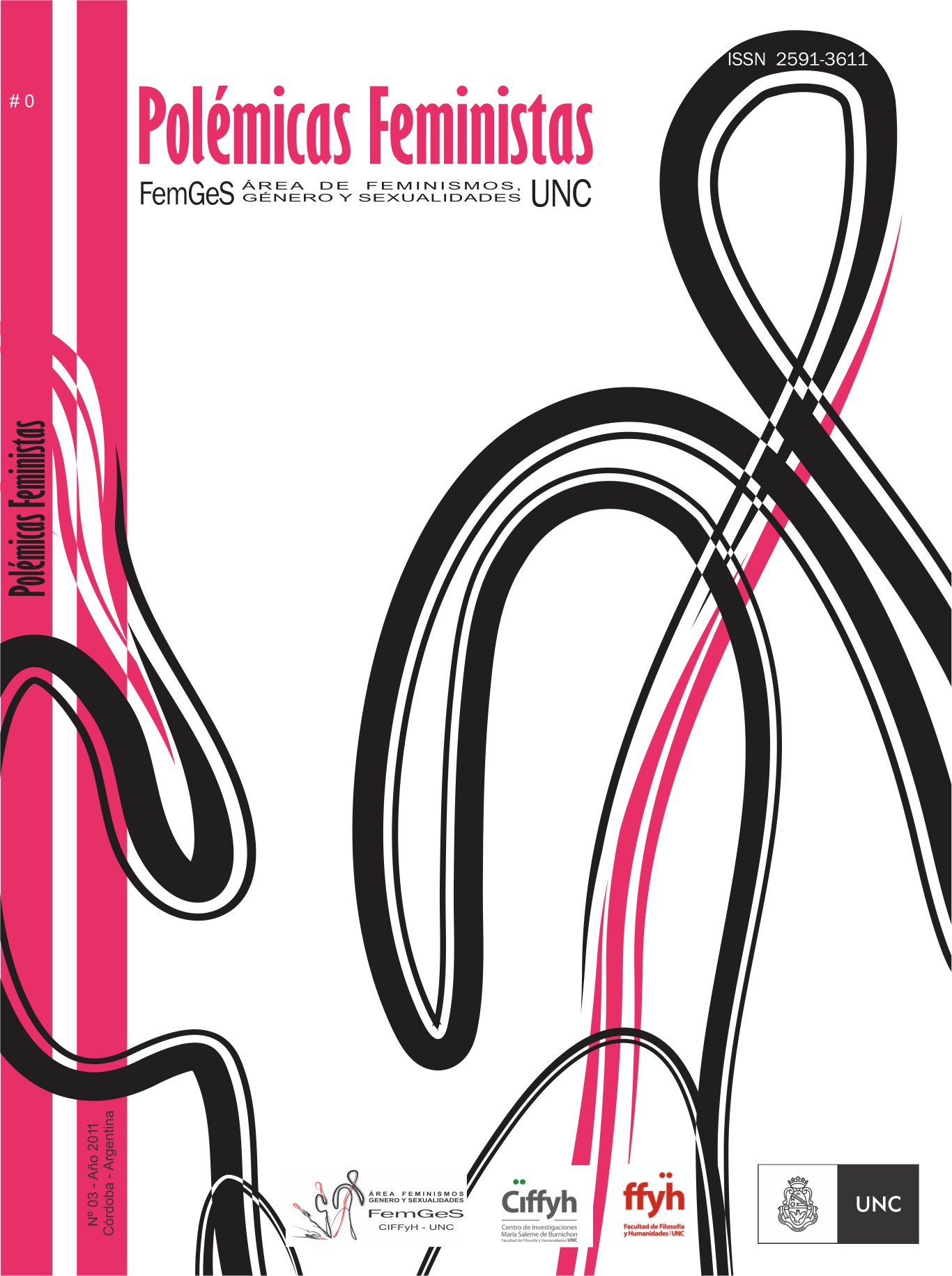
Aportes de los feminismos a las ciencias sociales y humanas
Vol. 1 (2011)El objetivo general de este primer número fue hacer un mapeo de las contribuciones de los feminismos y los estudios de género a las diferentes disciplinas de las ciencias sociales y humanas desde la década de 1980. También quisimos presentar la historia de la dependencia universitaria que vio nacer esta revista, llamada por entonces Programa Interdisciplinario de Estudios de Mujer y Género (PIEMG), relatada en primera persona por algunas de sus integrantes en una entrevista que da cuenta de un proyecto académico y político sostenido con tenacidad.





